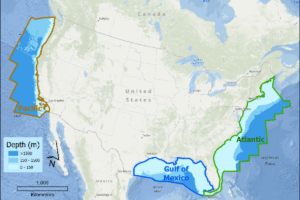Oil rig workers, maintenance staff, and roustabouts who work on offshore facilities qualify for federal longshore and harbor worker compensation if they are injured while working on the outer continental shelf. This is guaranteed by certain provisions of the Outer Continental Shelf Lands Act (OCSLA) that resemble the Jones Act. OCSLA, implemented in 1953, is a federal law establishing the U.S. government’s title and jurisdiction over underwater lands. The Federal government has OCSLA jurisdiction at points three miles off any state’s coast. OCSLA was derived from an earlier 1953 law called the Submerged Lands Act (SLA).

The SLA was passed to return to the states the title to offshore land located three miles from their coasts It also granted the Department of the Interior authority to grant leasing rights to oil and mineral production companies that meet strict responsibility requirements. The subsequent OCSLA extended that authority to cover underwater areas on the outer continental shelf.
The Jones Act and OCSLA
Because the Jones Act defines coastwise points as any location sited three miles off the coast of any state or U.S. territory, all of its provisions apply to any structure, facility, or other devices connected to the seabed or continental shelf. The OCSLA of 1953 legally extends the Jones Act to various permanent and temporary offshore facilities, structures, or devices, including:
- Artificial islands
- Oil rigs
- Wind turbines
- Natural gas extraction rigs
- Floating drydocks
Although OCSLA doesn’t cover ships as offshore structures or devices, the Jones Act still applies to these offshore activities because they are used in finding, extracting, or developing natural resources in the outer continental shelf area. The Jones Act also applies to U.S. flag vessels that support those facilities in any way, including oil spill response vessels (OSRV).
If an American-owned OSRV is involved in a cleanup operation near a damaged offshore oil rig, a seaman who is injured aboard can sue the owner if the defendant was negligent or the OSRV was unseaworthy.
OCSLA and the Longshore and Harbor Workers Compensation Act
The Longshore and Harbor Workers Compensation Act (LHWCA) is a law passed by Congress in 1927 that covers stevedores, dock workers, ship fitters, and other maritime workers not covered by the Jones Act. It is administered by the Department of Labor’s Division of Longshore and Harbor Workers’ Compensation.
Under LHWCA, qualified maritime workers are entitled to temporary benefits that equal two-thirds of their average weekly while undergoing medical treatment for job-related injuries. Once the treatment is complete, LHWCA can either provide compensation for injured body parts or two-thirds of their lost wage earning capacity.
The Pacific Offshore Operators, LLC v. Valladolid Decision
Several U.S. Circuit Court decisions have confirmed OCSLA regulations concerning LHWCA coverage. These court rulings grant LHWCA awards to offshore workers hired to work on oil rigs or other structures designed to exploit minerals and other natural resources on the Outer Continental Shelf.
In 2012, the U.S. Supreme Court unanimously upheld the Ninth Circuit Court’s decision to overrule the Benefits Review Board’s denial of compensation to the widow of Juan Valladolid, a general manual laborer hired by Pacific Offshore Operators to perform janitorial work on offshore oil rigs. Although he was killed in an accident at a Pacific Offshore Operators’ shore facility, an LHWCA claim was filed because he was performing duties related to his offshore assignment at the time of his death. Pacific Offshore Operators and the Benefits Review Board rejected the claim, stating that Valladolid was not on an offshore facility governed by OCSLA. They based the rejection on a limited interpretation of the statute’s “causation nexus” rule. Per the OCSLA causation regulations, if an injury is not related to oil drilling or the repair of mineral extracting machinery, then the plaintiff can’t make an LHWCA claim with the Department of Labor. (DOL)
The defendants argued that Valladolid died while working at their shore facility and not on the offshore oil rig. However, both Ninth Circuit Court and the nine Supreme Court Justices disagreed. They noted that even if Valladolid was not working on the oil rig at the time of the accident, he was still performing duties that supported the operation of the rig. In the Supreme Court ruling, Pacific Offshore’s contention that OCSLA only applies if workers are doing jobs on the continental shelf was dismissed. Instead, the Justices backed up the Ninth Circuit Court’s comment that restricting OCSLA-related claims only to offshore accidents violated the law’s intent.
Please fill out our contact form to see how we can help you.